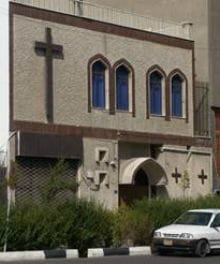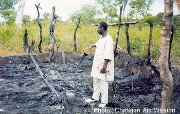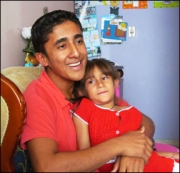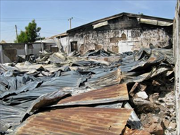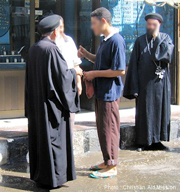Prime Minister claims opposition used Islamist demands to destabilise government
 |
Cattle market in Dhaka, pictured in 2008.
(W Jackson for World Watch Monitor) |
Prime Minister Sheikh Hasina of Bangladesh on May 17 alleged that the opposition party, the Bangladesh Nationalist Party (BNP), was responsible for a conspiracy to topple the government from power, using recent violent protests which have rocked Bangladesh, led by Hefazat-e-Islam.
“The opposition party tried to use Hefazat (the pan-Islamic umbrella organisation) to get into power, but if there’s public support and people stand beside us, no conspiracy can work, [whether] national or international,” she said.
But a senior BNP leader alleged that her decision to ‘ban’ political rallies in Dhaka for the next month is a ploy to prepare the ground for imposing a state of emergency.
“They have banned rallies and meetings to repress the opposition. All they are left with is to impose a state of emergency,” MK Anwar said on Monday 20 May as Sheikh Hasina’s decision ran into stiff criticism even from within her own ruling Awami League.
A spokesman for Hefazat-e-Islam (Protectorate of Islam) has pledged a halt in its mass protests, but continues to accuse Christian missionaries of “targeting” poor people and “putting pressure on them to be converted”.
In the wake of the arrest of three Hefazat leaders on Sunday (May 19), Maulana Ashraf Ali Nizampuri told World Watch Monitor the Islamic group had “no plans” for further protests.
“Many of our leaders have been arrested and a ripple of fear of arrest is passing through our leaders, so we [already] postponed a country-wide strike planned for May 12,” he said.
The three Hefazat leaders arrested on May 19 were charged with murder, theft and possession of explosives, after the group led a siege of the capital Dhaka on May 5, during which at least 11 people were killed.
US-based Human Rights Watch said on May 11 the precise number of deaths was “unclear, with figures ranging from the official government figure of 22 deaths nationally to Hefazat’s estimate of thousands”. Independent news sources estimated the number killed as approximately 50, including several law enforcers.
Background
In April, Hefazat activists had organised the country’s largest political gathering in decades to publish a 13-point charter of demands, including the introduction of a blasphemy law to punish those who desecrate Islam and its prophet Muhammad.
Four bloggers were arrested in April for allegedly writing defamatory and anti-Islamic elements in their blogs. According to existing Bangladeshi law, anyone convicted of defaming a religion on the Internet can be jailed for up to 10 years.
The issue of blogging had become an issue after a group of online activists took to Dhaka’s streets in February to demand the death penalty for the leader of Jamaat-e-Islami (the largest Islamist party in Bangladesh), Abdul Kader Mullah. He had been given a verdict of life imprisonment on February 5 for committing mass murder, rape, looting, and other crimes against humanity during Bangladesh’s war of liberation against Pakistan in 1971.
Tens of thousands protested in the area of Shahbagh in central Dhaka, considering this (one of three possible verdicts) too lenient. They demanded that all war criminals should be given the highest punishment: a death sentence.
Before the Dhaka siege, Sheikh Hasina had clarified the government’s position on the banning of religious conversion and the other demands of Hefazat.
“Everybody in Bangladesh has religious freedom,” Hasina said, addressing a press conference at her official residence the night before the siege.
The Bangladesh constitution says that every citizen has the right to “profess, practice and propagate” any religion, and that every religious community and denomination has the right to establish, maintain and manage its religious institutions.
However, Hasina said that forcefully converting people from one religion to another is an offence punishable by law and she promised that the government was monitoring the actions of foreign organisations.
“The law enforcers are keeping watch on NGOs [non-governmental organisations] that are allegedly converting people by taking the advantage of poor people,” said Hasina.
Nevertheless, despite promising no more mass protests, Nizampuri of Hefazat-e-Islam continues to accuse Christian missionaries of “targeting” poor people and offering them money to “pressure them” into changing religion.
“Most Christian missionaries are converting people by offering money among the poor people to give them a leg-up,” he said. “Once the poor people take money, the missionaries put pressure on them to be converted. That is why we are protesting – to stop missionaries converting [people].”
However, Bangladeshi pastor James Saberio Karmoker said Hefazat’s accusations were only propaganda.
“Christian missionaries are not converting people forcibly,” said Rev. Karmoker, who is general secretary of the National Christian Fellowship of Bangladesh.
“It is Hefazat propaganda. Conversion is not an event in which missionaries give money and people are converted. It is a long process. When faith in Christ grows in people through a long process of propagation, when they proclaim to have faith in Christ, only then do we go through the formalities of conversion. Conversion cannot be done forcefully; otherwise there would be a riot.”
Sheikh Hasina has been leading a secular government in the Muslim-majority country since 2009.
The United States Commission on International Religious Freedom (USCIRF) removed Bangladesh from its Watch List after the convincing victory of Sheikh Hasina’s Awami League in the 2008 general election. Her centre-left party is considered to promote secular policies and to be favourable towards the rights of minorities. Hasina’s announcement to implement reforms for religious freedom was another reason Bangladesh was removed from the Watch List.
Of Bangladesh’s 152.5 million people (UN, 2012), Muslims comprise around 88% with the remaining percentage a mix of Christian (1%), Buddhist and Hindu.
%2005-23-13.jpg)
